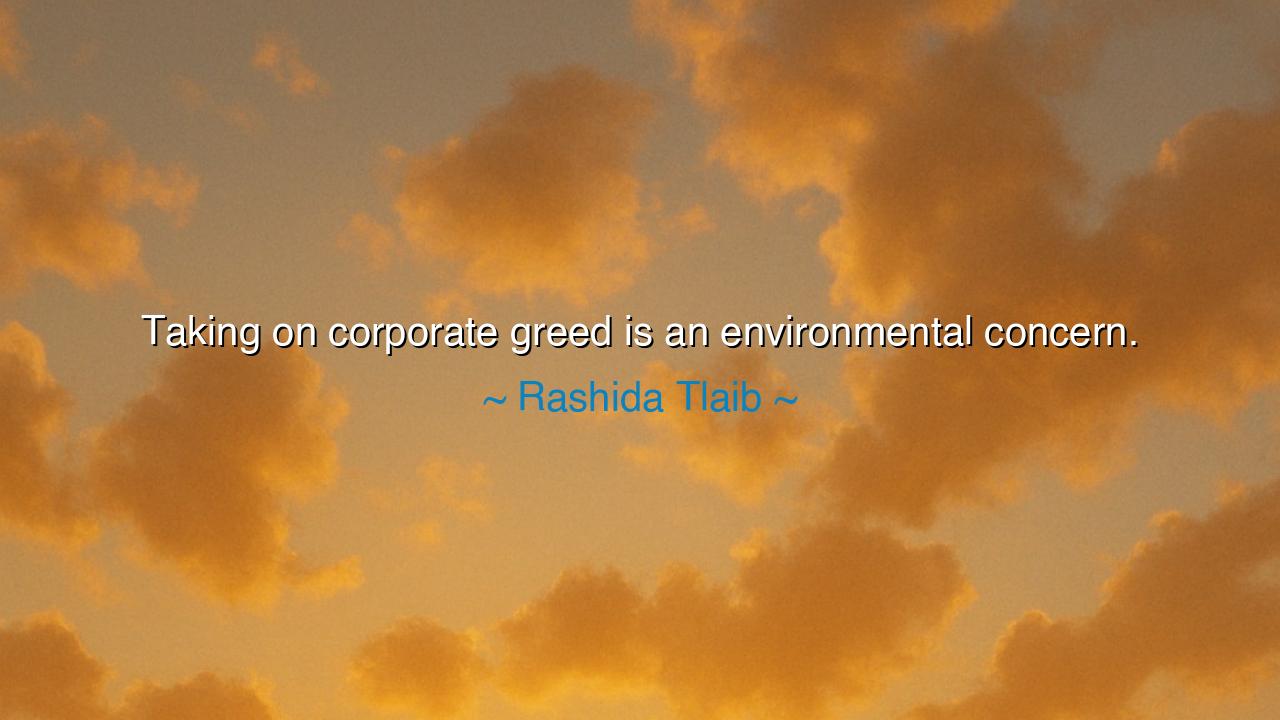
Taking on corporate greed is an environmental concern.






In the cadence of a watchman’s horn, Rashida Tlaib proclaims: “Taking on corporate greed is an environmental concern.” Hear the layers within this short oracle. She does not set two enemies across a field—economy on one side and ecology on the other—but reveals they are bound by one cord: when greed swells beyond measure, rivers grow bitter, lungs grow tight, and the future is mortgaged for a brief and burning gain. Thus the struggle is not merely about profits or policies; it is about whether we will bequeath to our children a living earth or a ledger of losses written in ash.
In the old tongue, we would say that hybris—overreaching pride—summons nemesis. So too does corporate greed provoke the judgment of nature. For the earth keeps a precise account. She remembers the refinery’s flare and the pipeline’s wound; she tallies the invisible debt of tailpipes whispering through the night. To call this an environmental concern is to speak with moral exactness: the poison in the well is minted first in the heart that refuses limits, and the cure begins not only with filters and fines, but with restraining the appetite that treats land and neighbor as expendable.
Let a lamp be lit from history. Remember Love Canal in Niagara Falls—homes built upon a buried cache of chemical waste, where children played over drums of forgotten profit. For years, illness rose like a fog: miscarriages, strange rashes, the dread geometry of clustered cancers. The reckoning came not by miracle but by mothers who kept notebooks, by neighbors who knocked on doors, by a community that refused to be told their suffering was “unrelated.” Their courage birthed reforms and the Superfund law, a vow that those who profited from pollution would pay for its repair. Behold how confronting greed became an act of environmental justice.
Or consider the Deepwater Horizon—an altar to haste in the Gulf of Mexico. There, a chain of cost-cutting choices unraveled into flame, and the sea wore a black mantle of sorrow. Fishermen found empty nets; pelicans folded their wings in oil; a coast learned that a single day’s negligence can echo for seasons. The lesson was carved on the waters themselves: when safety is bargained away to quicken the spreadsheet, the ocean sends the invoice to the innocent first and the guilty last.
So the origin of this saying is double-rooted. It rises from a modern tribune—Rashida Tlaib—whose witness is shaped by neighborhoods where refineries hum beside schoolyards, and it descends from the ancient law of the world: what we worship rules us, and what rules us shapes the air our children breathe. If we worship profit without proportion, we will harvest droughts, cancers, floods, and silence where birds once sang. If we honor stewardship, we will reap shade, clean water, and the quiet courage of a people at peace with their place.
What, then, shall we do? Bind accountability to power: demand transparent reporting of emissions, water use, and toxic releases; support regulation with teeth and enforcement that does not blink. Take your savings, however modest, and wield them like a shepherd’s sling: choose banks and funds that refuse to underwrite ruin, favor companies that price carbon and repair what they disturb. Where you live, insist on the humble revolutions—monitoring air quality, auditing energy use, planting windbreaks and trees, building community solar—for the local deed is the hinge of the global door.
Carry this teaching as a seal upon your heart: to confront corporate greed is to protect the commons. It is to say the river is not merchandise, the sky not a dump, the body not collateral. Speak it in councils and classrooms; write it into procurement and zoning; cast it with your vote and spend it with your coin. Teach the young that prosperity without prudence is a glittering famine, while restraint with justice is a feast that lasts.
And when doubt whispers that the powers are too vast, remember the mothers of Love Canal and the fishermen of the Gulf. Remember that law itself can be a form of love when it guards the small and reins the strong. Stand, then, like an ancient gate at the city’s edge: open to honest trade, closed to greed that poisons the well. For this is the narrow road to a durable peace—where profit walks beside planet, and the breath we borrow from tomorrow is returned, unspoiled, to those yet to come.






AAdministratorAdministrator
Welcome, honored guests. Please leave a comment, we will respond soon